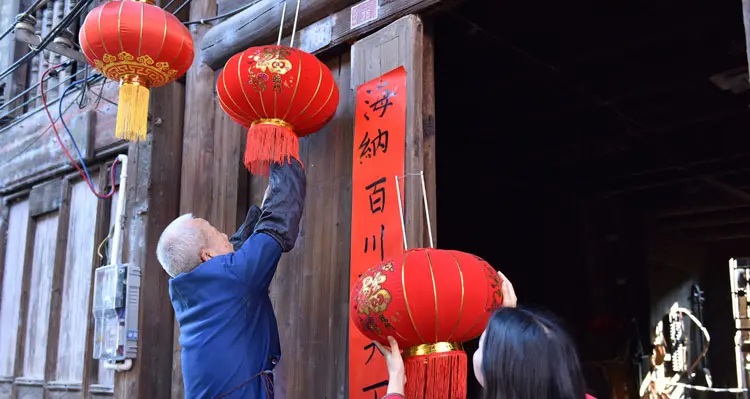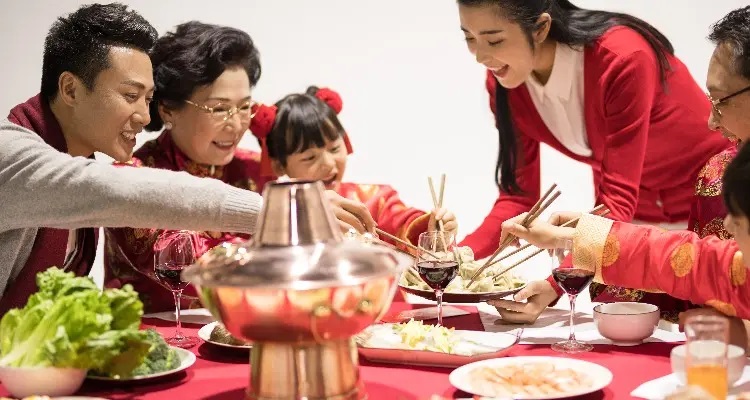Annually beginning with the new moon that occurs between January 21 and February 20 on Western calendars, Chinese New Year is celebrated for 15 days in China and Chinese communities around the world. The celebration continues until the next full moon.
Because the dates of celebration are based on the phases of the moon, the holiday is sometimes known as the Lunar New Year.
People in China have been given seven days off during the Chinese New Year since the mid-1990s. Spring Festival, a term sometimes used to refer to the Chinese New Year, has been designated as the name for this week of rest and relaxation.
The Chinese New Year’s celebration has mysterious origins. There is a tale that says every new year, thousands of years ago, a monster called Nian (“Year”) would terrorise the villagers. In order to scare the monster away, people used fireworks, bright lights, and the colour red.
It is common practise to use fireworks, firecrackers, and the colour red in New Year’s celebrations in the hope of warding off bad fortune and welcoming good fortune and a prosperous New Year. Red envelopes filled with cash are a common way to reward youth.
As an added bonus, Chinese New Year is a time for feasting and paying visits to loved ones. The holiday season is full of rituals that remember loved ones who have passed away.
History And Facts
The ancient Chinese would get together in the fall to celebrate the harvest season’s end, long before the custom of welcoming in the new year was established. This wasn’t the Mid-Autumn Festival, though, when Chinese people traditionally gathered to pay homage to the Moon as a family tradition.
An anonymous farmer of the Western Zhou dynasty (1045 BC – 771 BC) wrote a poem about the customs associated with the 10th month of the ancient solar calendar, which fell in the autumn, and it was included in the Classic of Poetry.

The poem describes how during this time people clean millet-stack sites, serve mijiu (rice wine) to guests, slaughter lambs, prepare their meat, visit the homes of their masters, drink to their health and the hope of a long and happy life together. It is widely accepted that the 10th-month festival was one of the earliest forms of the modern Chinese New Year.
Also Read Junji Ito Maniac: Japanese Tales of the Macabre; Season 1 Episode 10 Recap & Review!
The earliest known documentation of the Chinese New Year dates back to the era of the Warring States (475 BC – 221 AD). The Lüshi Chunqiu records that on the last day of the year, people in the Qin state performed an exorcism ritual called “Big Nuo” () in an effort to drive away disease.

After Qin’s unification of China and the establishment of the Qin dynasty in the 25th century BC, the practise spread throughout the empire. It eventually became customary to do a complete house cleaning in the days leading up to Chinese New Year.
The Han Dynasty
First time that new year’s celebrations are documented in Chinese history (202 BC – 220 AD). Cui Shi, an agronomist from the Eastern Han Dynasty, described a party in his book Simin Yueling: “Zheng Ri is the traditional name for the first day of the lunar calendar.

Also Read Who is Miley Cyrus’s Husband? Why They Broke Up?
To honour my father and pay respect to my ancestors, I have brought my family with me.” A while later he penned: “The children, the wife, the grandchildren, and the great-grandchildren all serve the parents pepper wine, raise a toast to their health, and offer their best wishes. This is a prosperous vista.” New Year’s Eve ancestor worship is still observed by many Chinese today.
What Is The Duration Of Chinese New Year?
Traditional Chinese New Year celebrations begin on the evening of January 31 and continue until the evening of February 10 (the Lantern Festival). The first seven days, from January 21st to the 27th of 2023, are set aside as official holidays.
Also Read Scream 6: Can You Solve Ghostface’s Crossword Puzzle?
The Chinese New Year’s tradition of paying respect to ancestors is strictly observed. On the day before Chinese New Year’s Day, many Chinese people pay a visit to their ancestors’ graves, offer sacrifices to ancestors before the reunion dinner (to show that they are letting their ancestors “eat” first), and set an extra glass at the table.

